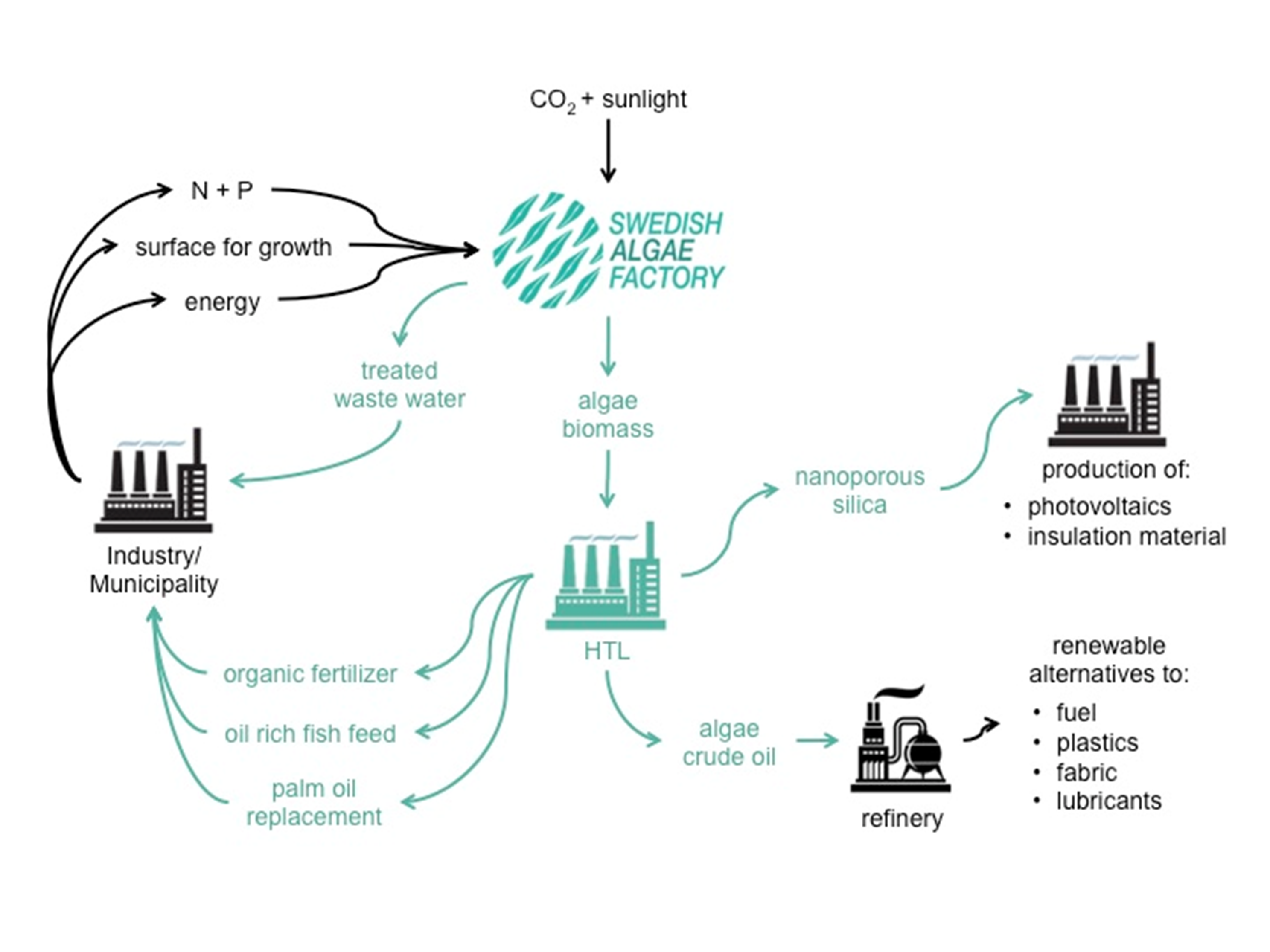“To solve the environmental challenges, we must work according to the laws of nature”. Sofie Allert, CEO and cofounder of Swedish Algae Factory (SAF), has clear priorities regarding sustainable business – and is walking the talk. SAF, working with diatoms in Gothenburg since 2014, is still in an early stage of development, but has plans to use circular business models with companies sharing the same values. The aim is to have 100 algae farms running by 2030, and potential partners so far span the spectrum from fish farming and agriculture, to production of renewable fuel, plastics, textiles, insulation materials, and photovoltaics. “The next step is to take it out of the lab – and make it financially sustainable”.
Growing at the speed of algae
Sofie Allert wrote her bachelor thesis in biotechnology on creating a renewable substitute for fossil fuels using algae. During her master’s education at the Chalmers School of Entrepreneurship, she met Angela Wulff, a professor in marine ecology. Professor Allert had noticed early the challenge for algae growth in the cold and dark Nordic countries, but during polar expeditions Wulff had found algae that were thriving despite these conditions. They developed a business concept around these types of algae, teamed up with more researchers, and in 2014 founded the company. They soon received a SEK 3 million (€320,000) grant from Swedish innovation agency Vinnova, and have already won several prizes and awards, such as the Green Mentorship Award worth SEK 1 million (€107,000) from Skype founder and innovator Niklas Zennström.
Algae research
Research is being conducted worldwide to identify potential products from algae. SAF is one of a small number of Swedish entities that conducts research on around 30 types of algae. The algae need sunlight, nitrogen, phosphorus, and carbon dioxide to grow. SAF extracts oil, nano-porous silica, and nutrient-rich biomass that can be utilized as fertiliser. The oil can be used as a replacement for fish oil and palm oil or further processed to a renewable crude oil and used to make commodities such as fuel, plastics, and lubricants. The nano-porous silica can function as a good insulating material, and as a thin layer that improves photovoltaic efficiency by up to 30%. The fertiliser can be used as an organic fertiliser on farmland. Since nitrogen and phosphorous are contained in water runoff in agricultural areas, there is a large potential for circular business models involving farms and food producers. The first partner of SAF will be a land-based organic salmon farm just north of Gothenburg on the Swedish west coast. Algae will grow in layers as a roof above the fishponds to make use of existing space and not take up new land. The fish farmer will provide nitrogen and phosphorus through the wastewater from the ponds. In return, the algae will clean the wastewater and some of the algae biomass will be turned into fish feed.
Swedish Algae Factory’s example of a circular business model based on algae’s natural life cycle

The future is tiny
The company is still operating on a small scale, but plans are developing quickly, thanks to the interdisciplinary CEO, who is not only educated in natural sciences and engineering but also in entrepreneurship. This type of cross-sectorial background teamed with holistic and sustainable business values can also be seen as a promising trend among the young generation of sustainability professionals. In an interview, Allert explained that, while the development of the Swedish Algae Factory is not dependent on certain aspects of public policy, political instruments and decisions in support of a circular economy could definitely help them. Even without political encouragement, growing interest from other companies to partner with them, and a general and increasing awareness of the value of sustainable business models gives Allert hope for her company.
Regional dimension
With the growth potential of algae farming and its diversity of products, expansion of the business sector can well become regional, national, and international. By turning the algae oil into a renewable alternative to fossil fuels, the production of fuels can be decentralised and regions could become their own fuel producers. Additionally, the diversity of products and functions derived from algae farming could allow for regions with different circumstances to adapt the production to their own needs. Regions with declining population and reduced job opportunities could also see the new green jobs in algae farming as a tool to regain some of their vitality.
Learn more…